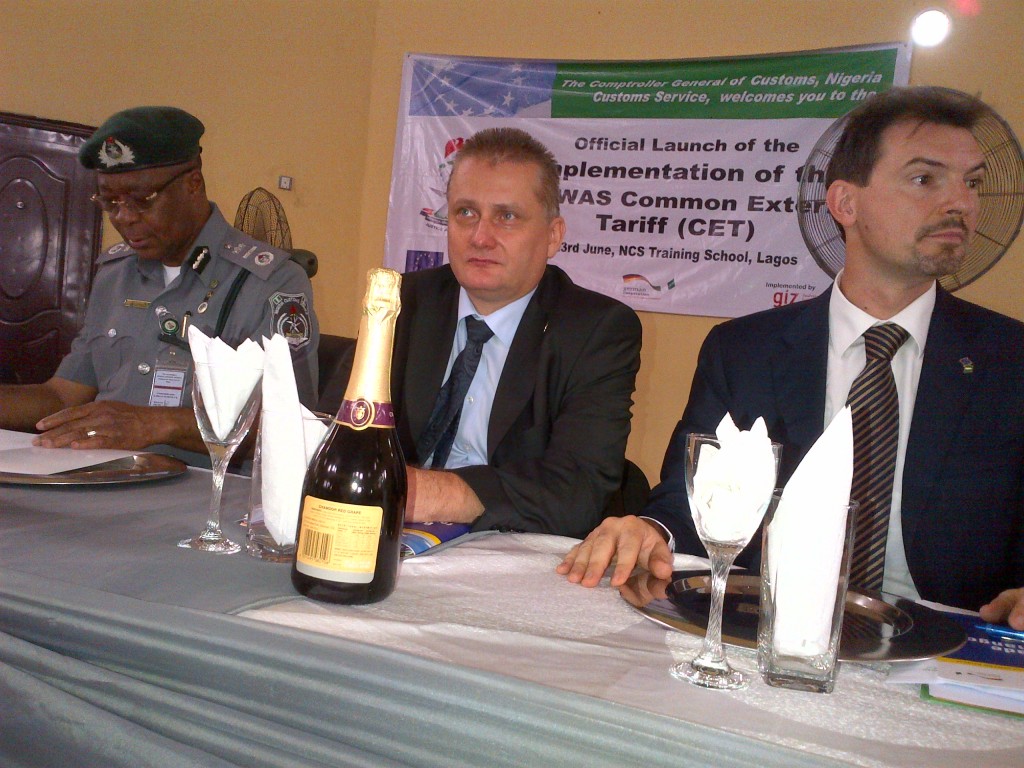…Lifts ban on furniture, textile import
The Comptroller General of the Nigeria Customs Service, Dr. Dikko Inde Abdullahi has assured the stakeholders that the Import Adjustment Tax (IAT) component of the ECOWAS Common External Tariffs (CET) would continue to be gradually phased out until the 2020 deadline when the detailed provision of the ECOWAS CET would be in full force.
Dikko who made this known at the official launch of the implementation of the CET in Lagos yesterday, pointed out that members states were permitted to apply temporary provisions which includes the Import Adjustment Tax and Special Protection Tax (SPT) to allow them to adjust to the ECOWAS CET during the 5-year transitional period of 2015-2019.
Represented by the Assistant Comptroller General in charge of Zone A of the Nigeria Customs, ACG Victor Gbemudu, the Comptroller General explained that the Special Protection Tax (SPT) was contingent on the behavior of import volumes and import prices following the entry into force of the ECOWAS CET while the Import Adjustment Tax (IAT) was designed to help countries that have to adjust to a lower tariff structure undergo a smooth transition.
According to him,” All we are just doing in these for a is to have stakeholders coming to understand what the Common External Tariff is all about. And Common External Tariff to a large extent also come with some adjustments for member countries and as you know, there are 97 chapters in the Common External Tariff of which they have 5,899 headings, out of these 5,899 headings, every member country is entitled to 3 percent adjustment. This 3 percent adjustment is just spread into 177 tariff headings.
“So, these enable most member countries to be able to protect whatever interest they have to protect. Like in Nigeria for instance, you have the National Automotive Policy, you have the Sugar policy, you have the Solid Mineral Policy and you have the agricultural policy.
“So, this 3 percent is for the 177 line. It is supposed to protect some of these our industries and as you all are aware, in protecting all these, we now have what we called Import Adjustment Tax on each of these items. So, this is what it is all about. I think at the end of the day, it is going to take some time because these ones are supposed to stand for five years as it were but by 2020, we hope everything would be fully harmonized”.
He mentioned that with the advent of the CET, a lot of items in the prohibition list had been removed such as furniture, textile among others saying that these items would now pay duty applicable to them as well as pay the Import Adjustment Tax.
The Customs boss further explained that with the CET, whatever is implementable in Nigeria would be implementable in other member countries in the sub-region even as he said that whether one cleared his or her cargo in Cotonou or elsewhere, it was be all embracing.
“I know why you are saying unfriendly because probably, you think Nigerian policy is higher, that is why it common now. But mind you again that we have what we call Import Adjustment Tax, if it is higher in Nigeria, then you pay what the difference is”, Dikko said
On his part, the Country Director of the German firm that co-sponsored the programme, GIZ Nigeria, Dr. Thomas Kirsch represented by Mr. Christian Widmann recalled that GIZ had been implementing development programmes in Nigeria since 1974 based on a bilateral Nigeria-German Technical Cooperation Agreement.
Kirsch noted that GIZ was implementing SEDIN which he said was aimed at strengthening Nigerian Micro, Small and Medium Enterprises (MSME) through improving their access to finance, the environment for doing business, their application in selected value chain and their access to domestic and regional markets.
He said,” For the later, SEDIN works closely with various public and private sector institutions in Nigeria to build their capacity towards the formulation and implementation of trade policies that supports growth and job creation in the MSME sector. With additional funding from the European Union under the Strengthening Nigeria’s Trade Support Institutions (SNTSI) Programme, we are amongst others, supporting the Nigeria Customs Services (NCS) as well as the Federal Ministry of Finance in their strive to implement the ECOWAS Common External Tariff (CET) in Nigeria.
“We commend the NCS initiative of launching the implementation of the CET across the country, as this will ensure that all the various stakeholders are fully conversant about the details and rationale of the new policy including both the policy implementers as well as all the private sector actors who will be affected by this new trade policy”.

